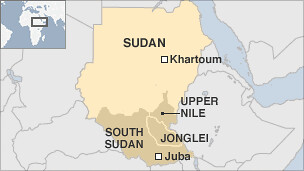
A rebellion is spreading in South Sudan in the aftermath of a referendum held in Jan. 2011. The outcome of the vote could lead to the break-up of Africa's largest geographic nation-state. The independence of the south is slated for July 2011., a photo by Pan-African News Wire File Photos on Flickr.
April 25, 2011
Instability Is Worsening in Southern Sudan
By JOSH KRON
KAMPALA, Uganda — The persistent violence in southern Sudan has killed more than 150 people in the last week alone, the regional government said on Monday as it continued to struggle to control its own territory less than three months before independence.
One southern Sudanese rebel leader, Gen. Gabriel Tang, surrendered Sunday night after months of fighting against the southern army, a southern army spokesman said, just days after 67 rebels were killed in the most recent clashes.
At the same time, a different rebel group in a nearby region claimed victory over the southern Sudanese army in clashes near the town of Mankiem during which 84 people were killed, the spokesman said. He did not specify how many were combatants and how many civilians.
“We don’t want wars on our borders,” said the spokesman, Brig. Gen. Malak Ajok. “For sure, we will be able to defend south Sudan.”
But the closer southern Sudan gets to becoming the world’s newest country, the less stable it appears. Numerous southern Sudanese rebellions have broken out since voters overwhelmingly approved a January referendum on independence from the north, not including the unrelenting tensions between northern and southern Sudan in the contested region of Abyei.
This month, the United Nations said more than 800 civilians had been killed in violence in the region since January, and the organization Human Rights Watch said last week that human rights abuses had been committed by both the southern Sudanese government and the rebels in recent fighting.
“If the southern Sudan government wants a sustainable peace when it becomes fully independent in July, it should demonstrate its commitment now with a prompt and thorough investigation into human rights violations,” said Daniel Bekele, Africa director for the organization.
Both northern and southern Sudan were meant to demobilize tens of thousands of soldiers in a United Nations-backed disarmament program, but few have even begun the process, leaving many parts of this vast and undeveloped region volatile.
Southern Sudanese officials have also been implicated in widespread human rights abuses against the government’s own security officers in a police-training program also supported by the United Nations.
The southern Sudanese rebel groups are fighting for a variety of reasons. General Tang, also known as Tang Ginye, for instance, was a longtime foe of southern Sudan’s ruling party, accused of massacres in 2006 and of being a proxy of the north.
Gen. Peter Gatdet, a rebel who leads the South Sudan Liberation Army, defected last month, and accused the southern Sudanese government of being dominated by ethnic Dinka.
No comments:
Post a Comment